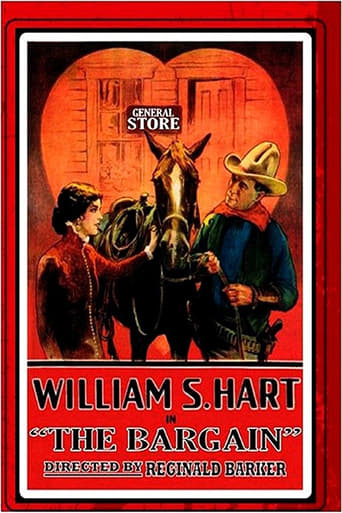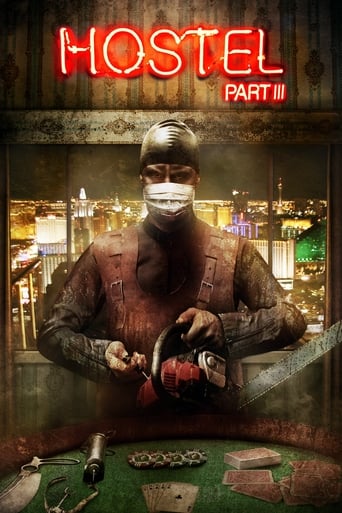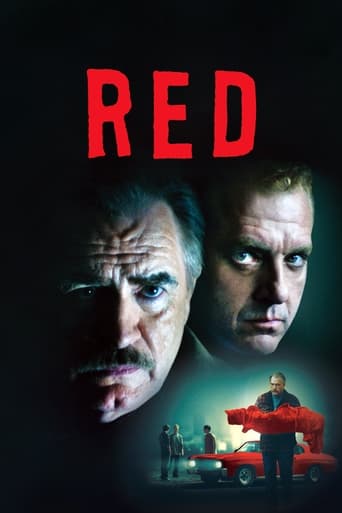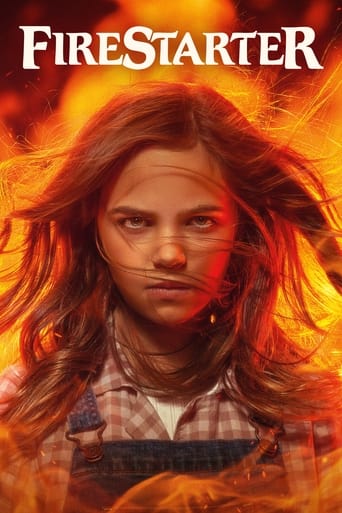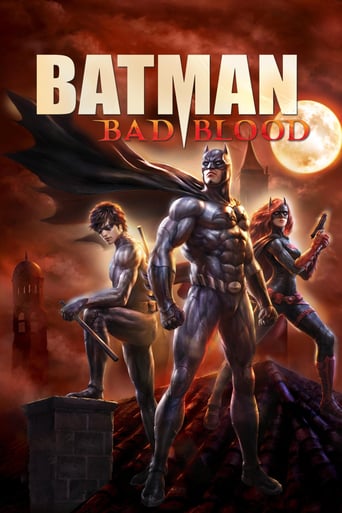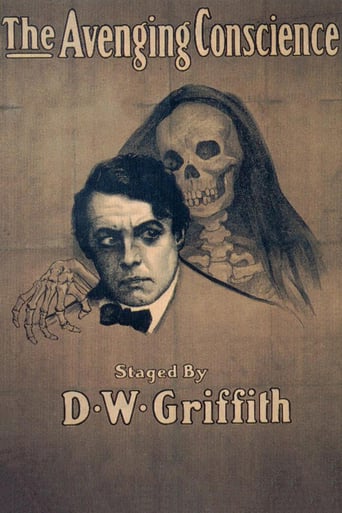


The Avenging Conscience
Thwarted by his despotic uncle from continuing his love affair, a young man's thoughts turn dark as he dwells on ways to deal with his uncle. Becoming convinced that murder is merely a natural part of life, he kills his uncle and hides the body. However, the man's conscience awakens; paranoia sets in and nightmarish visions begin to haunt him.
-
- Cast:
- Henry B. Walthall , Spottiswoode Aitken , Blanche Sweet , George Siegmann , Ralph Lewis , Mae Marsh , Robert Harron


Reviews
Tells a fascinating and unsettling true story, and does so well, without pretending to have all the answers.
At first rather annoying in its heavy emphasis on reenactments, this movie ultimately proves fascinating, simply because the complicated, highly dramatic tale it tells still almost defies belief.
A movie that not only functions as a solid scarefest but a razor-sharp satire.
Although I seem to have had higher expectations than I thought, the movie is super entertaining.
Avenging Conscience; Thou Shalt Not Kill, The (1914) *** (out of 4)Feature from D.W. Griffith, which he quickly shot before he started filming on The Birth of a Nation. An uncle is constantly putting presure on his nephew (Henry B. Walthall) to spend more time on his work. When the nephew falls in love with a local girl (Blanche Sweet) the uncle demands that they call it off. When the nephew can't think of anything else, he decides the only way to keep the girl is by killing the uncle. This film is based on several Edgar Allan Poe stories with the second half of the film dealing mainly with The Tell-Tale Heart. You can tell this film was quickly made but there's still some nice direction, good performances and G.W. Bitzer's wonderful cinematography. There's some nice scenes dealing with devils and ghouls from Hell as well as a scene of Jesus. The special effects are quite nice for the era as well. Mae Marsh and Ralph Lewis have small parts. Due to the lack of copyright laws at the time, Griffith used all these short Poe stories without any credit being given.
'The Avenging Conscience' isn't the weirdest movie on DW Griffith's CV, but it's well up there. This is a drama of modern 1914, but it's firmly influenced by several stories of Edgar Allan Poe, who is referenced (by name and daguerreotype image) in the film.Henry Walthall plays a young man whose mother died giving birth to him, and who apparently has no father, so he's been raised since birth by his uncle (Spottiswoode Aitken, excellent performance). We see Aitken doting on the nephew as a child, then turning harsher (in convincing old-age makeup) as he tells his grown nephew to help him in his business affairs. Aitken's character wears an eyepatch over his left eye; this seemed entirely pointless, until Walthall as the nephew starts reading Poe's 'The Tell-Tale Heart'. In that story, you will recall, the young narrator lives with an older man who has a defective eye ... and eventually murders him. Walthall is in love with the girl semi-next door over, well-played by Blanche Sweet. We're never told her character's real name (nor anybody else's in this movie), but we learn that Walthall makes a point of crying her Annabel. This is clearly from Poe's tragic poem 'Annabel Lee', but that makes little sense. 'Annabel Lee' (inspired by Poe's real-life marriage to his much younger cousin, who died in her teens) is about a child-like woman who dies far too soon. Why would any Poe devotee give this monicker to a more mature woman such as Sweet's character, unless he's hoping she'll die?SPOILERS COMING. Eventually, Walthall quarrels with Aitken, and kills him ... then bricks up the body in the chimney with laughable ease. From this point, the story becomes steadily less logical. For instance, Aitken's disappearance remains unsolved (Walthall claims he's left town), yet Walthall has no difficulty inheriting his absent uncle's estate, without a death certificate. And a detective (the under-rated Ralph Lewis) shows Columbo-like powers, somehow intuiting every detail of the crime ... even to noticing the brickwork in Walthall's inglenook. Walthall's house conveniently has a trapdoor escape hatch, but Lewis has just as conveniently rumbled it and nailed it shut. Then Aitken comes back as a one-eyed ghost to haunt Walthall, only it's clear that he's a manifestation of Walthall's guilty conscience rather than a genuine supernatural spook.There's an attempt to evoke the mood of 'The Tell-Tale Heart' ... in which the nervous murderer, feeling his own heart pounding in his chest, mistakes it for the still-beating heart of his victim. But this is a silent film, so -- instead of the sound of a heartbeat -- we see detective Lewis repeatedly tapping on the tabletop. Unfortunately, the rhythm of his taps doesn't match the steady iambic pulse of a heartbeat. More positively, there's a stand-out performance by George Siegmann as an Italian prole. Siegmann expertly emotes his prole role with just the right amount of Neapolitan gesticulation to make himself convincingly Italian, without indulging in 'mama-mia' exaggerations.Along the way to the ending, we see the ghouls mentioned in Poe's poem 'The Bells' (which had earlier inspired another guilt-stricken mellerdrammer: a stage play by Leopold Lewis, staged by Sir Henry Irving). We also see the pagan god Pan (who has little or nothing to do with Poe) accompanied by some ridiculous nappied acolytes. BIG SPOILER NOW: Oh, it turns out that the whole pesky murder (and everything that came after it) was just a dream, so Walthall is reconciled with the unmurdered Aitken, who accepts Sweet. The set dressing in Sweet's bedroom vaguely resembles a human face, but I think that's unintentional. A weird movie but definitely an interesting one, and its basic implausibility makes this story work better as a silent. My rating: 8 out of 10 just this once, but ... nevermore!
The opening scene sets the mood for this eerie and curious Griffith film; a family is in mourning, where the uncle (played by Spottiswoode Aitken) turns towards his infant nephew. Once the boy is a man (played by Henry Walthall), his uncle is still guiding him through life. The conflict begins when the nephew has a love interest (played by Blanche Sweet), which the uncle feels is incompatible with the plan he has set for his nephew.Loosely based on Edgar Allan Poe's "The Tell-Tale Heart", with appropriate takings from Poe's poem "Annabel Lee" to help move the plot, this is the most extrinsic of Griffith's films--neither an epic, nor a quaint romance, for which he is renowned. In most ways, it's more similar to later psychological or expressionist films from Scandinavia and Germany. The slow pacing and use of irises and other methods add to the pang of this psychoanalytic horror. The restrained performances are even more vital, especially Walthall's forceful performance, again displaying his versatility--rarely has a nervous, psychotic breakdown been done better.It's impressive that Griffith succeeded as much as he did in such a foreign genre, especially in his imperfect period before "The Birth of a Nation"; therefore, the flaws are surprisingly few and excusable. Again, Griffith inserts a supplementary romance, or "The Contrast", as he called it; in this movie, it is particularly misplaced, unnecessary and feckless. Perhaps its removal would have allowed for needed development of the uncle. I wonder why he was so frantic and selfish in his vicariousness. Finally, the ending is of what would be one of the more contemptible of such conventions. Griffith slightly recovers, however, with the most queer scene in the film--the Pan fantasy, in a way, reasserts Walthall's character's insanity.
Inspired and vaguely based on Poe's The Telltale Heart and with the words of Poe's Annabel Lee on some of the titles.Some interesting shots of mad visions and of fiends from hell.For dance historians a short 'Greek/Roman' dance at a garden party.

